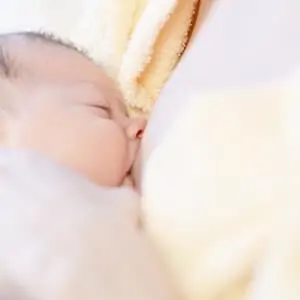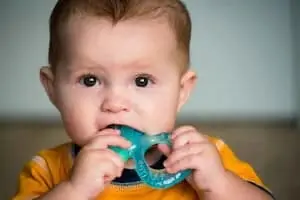You think that everything is going well with nursing, but then you notice a clicking sound when breastfeeding and start to wonder if something could be wrong.
Babies make all kinds of noises when they breastfeed, and it can be hard to determine which sounds are normal and which ones might indicate a problem. That means parents need to know what sounds are normal while breastfeeding and which noises might warrant a call to the doctor.
Normal Sounds Your Baby Might Make While Breastfeeding
When I began to breastfeed my first child, I had no idea how noisy babies can be while nursing. Babies are rarely silent. You might notice your baby cooing while breastfeeding or making strange grunting or moaning sounds.
Some sounds can be downright funny.
Thankfully, most noises that your baby makes are normal; think of them as an indicator that your baby is happy nursing and receiving all of the nutrients needed. Here are some of the usual noises your baby might make while nursing.
- Exhaling
- Grunting
- Swallowing
- Inhaling
- Cooing
- Quiet Moaning
Why Does My Baby Make a Clicking Noise While Breastfeeding?
Believe it or not, clicking while breastfeeding is common, and it doesn’t always indicate a problem at hand. Sometimes, the clicking can be quiet and hard to distinguish from the other sounds taking place. Other times, the clicking can be loud and problematic for the parents.
Typically, the clicking sound you hear comes from breaking the seal created between your baby with his lips around your breast. The incoming air combined with the breaking of the suction results in an audible clicking sound.
There are several reasons why your baby might making a clicking sound, so let’s take a look at each one to help you determine what your baby is doing!
You Make Too Much Milk

When you make too much milk, it can cause you to have a forceful letdown, and your baby might have trouble keeping up with the fast flow of your milk. So, as your baby tries to swallow quickly, it creates a clicking sound as they gulp quickly.
An overabundance of milk also can break the suction. If your baby struggles to keep up with the letdown, milk can leak out of the sides of his mouth, causing the suction to break.
Your Breasts Are Engorged
Having engorged breasts is never fun; it means your breasts are too full of milk, either from not expressing enough or an oversupply of breast milk. Engorgement is expected in the early weeks of breastfeeding as your body works to adjust your milk supply.
Being engorged can cause a clicking sound while nursing because your breasts are hard and full, making it hard for your baby to latch correctly and maintain the suction needed. Typically, if engorgement is the problem, you’ll only notice it for a short period until your baby drains enough out of your breasts.
Your Baby Has a Bad Latch
One of the most common reasons for your baby clicking while breastfeeding is a bad latch. When your baby has a good latch that he can maintain, you won’t hear a clicking sound typically. A lousy latch means your baby needs to adjust his tongue and lips to keep a hold frequently.
There is an Anatomical Abnormality
If you’re wondering if clicking a sign of a tongue tie, the answer is yes; it can be a sign of this! Any abnormality in your baby’s mouth, such as a high palate, tongue tie, or even a lip tie, can make maintaining a proper latch difficult for your child.
In the last decade, knowledge and understanding of tongue ties has increased, and we now know how hard breastfeeding can be if your child has a tongue-tie. If your child has this issue, you’ll see a thick band of tissue connecting his tongue to the floor of his mouth, which restricts the movement of his tongue.
Note that:
Being tongue-tied can make it hard for your baby to hold his tongue in the proper position for breastfeeding. Each time his tongue goes back, it causes a clicking sound. Later in life, a tongue tie that is not clipped can cause speech problems.
Your Baby Has an Ear Infection
If the breastfeeding clicking sound develops suddenly, it could be due to an ear infection. Your baby must have a strong suck to breastfeed efficiently, and an ear infection makes it harder to do so because of the pressure build-up.
Pressure builds up in your baby’s ear as he suckles, and if an infection is present, that leads to pain. So, to reduce the problem, your baby will let go of his suction to relax his jaw and release any pressure.
Your Baby is Teething

This is a temporary reason for clicking. Teething causes your baby’s mouth to be sore, and he might not create as tight of a seal around your breast. The discomfort also could cause him to break the suction repeatedly.
Another issue is that, once teeth pop out, he might repeatedly break the suction because he’s not used to the feeling of teeth in his mouth while breastfeeding. This is also temporary; they get used to it quickly.
Thrush Is Present
Infections of any sort can make breastfeeding harder for you and your baby. The most common infection that would cause a clicking noise is thrush.
Thrush is a common yeast infection that develops in a baby’s mouth. You might notice that your baby’s tongue is covered in a white film that doesn’t come off; that’s thrush. Thrush can also cause discomfort, soreness, and itchiness, making it hard for your baby to latch consistently.
Signs That The Clicking Sound is a Problem
As you can see, a few of these reasons aren’t a cause for concern. The clicking might be a bit annoying, but things such as an oversupply or engorgement tend to go away as you breastfeed longer.
Clicking sounds can be an indicator of a problem, usually accompanied by other symptoms. Here are signs to watch for while breastfeeding.
Dimpling Cheeks
It can be hard to understand the difference between normal sucking sounds and a clicking sound. Watch to see if your baby has dimpled cheeks that accompany the clicking sound.
Sore Nipples
Some soreness can be expected during the first few days of breastfeeding after birth, but breastfeeding shouldn’t be painful or cause sore nipples after that. Any pain indicates that your baby is having problems while breastfeeding.
Misshapen Nipples After a Feeding
After feeding, if your nipple looks creased or slanted, it might mean that your baby has a tongue tie that causes the clicking. It might also come with pain or cracking of the nipple skin.
Mouth Trauma
Take a close look at your baby’s mouth to check for any abnormalities or infections. It can be hard to diagnose a tongue or lip tie yourself; you might need to go to your pediatrician or lactation consultant to confirm the problem.
Trouble Gaining Weight
A baby that isn’t having any trouble breastfeeding will gain weight appropriately and meet milestones. Make sure you go to all of your child’s well-child check-ups and watch his weight gain to be sure your baby is eating enough.
How Do I Stop My Baby from Clicking While Breastfeeding?
Don’t panic if you notice your baby makes noise while breastfeeding, but if any of the troubling signs accompany the clicking, you want to get down to the root of the problem.
Here are some suggestions.
Check for a Tongue or Lip Tie
A tongue or lip tie can be a culprit for the clicking sound, so the first thing you should do is check to see if your baby has one. It can be challenging and take time, and you might need to schedule a visit with a pediatrician or a lactation consultant to be sure.
If your baby does have a tie, it doesn’t automatically mean that you need to get it clipped. As long as you can breastfeed comfortably and your baby is gaining weight appropriately, then you might not need to cut the tie. If your baby struggles to latch and not eat as much as he should, you can get the tongue tie clipped; it’s an easy procedure.
Try New Positions

Trying new breastfeeding positions can be helpful. It can help with an overactive letdown and help your baby to get a better latch. Try different positions and see if you notice clicking more or less with certain ones.
Express Before Latching
If you think that your baby is clicking either from engorgement or an overactive letdown due to oversupply, expressing before latching can be beneficial. You can use a manual pump or hand express milk out before latching your baby.
This helps because it gets the heavy letdown out of the way, so your baby won’t drown on the milk. It also can reduce engorgement by getting out some of the milk.
Check for Any Infections or Teething
If your baby recently began to act strange, it might be because he has an ear infection, thrush, or teething. These are all common ailments that cause discomfort for your child. Take a good look to see if you can find a problem and schedule a doctor’s appointment if you do.
Visit a Lactation Consultant
If you can’t solve the clicking problem yourself, working with a lactation consultant is your best bet. LCs are trained to understand the reasons for a clicking sound while breastfeeding, and they know what to do to ensure you can continue to breastfeed successfully.
Try Not to Panic
You might get upset when you hear a clicking sound while breastfeeding. Try not to panic; it’s not always a sign that something is significantly wrong. If there is a problem, you can fix them easily! Make sure to talk to a lactation consultant if the issues continue.
Hey, this is Linda. My biggest accomplishment in life is being a mother of four children. Their current ages range from almost ten years old down to 20 months old.
I’m passionate about writing parenting articles because I understand so well all of the problems and trials you face as a parent. From breastfeeding woes to budgeting problems and behavior problems, along with everything in between, chances are I’ve faced it over the last ten years. Read more about Linda here.






